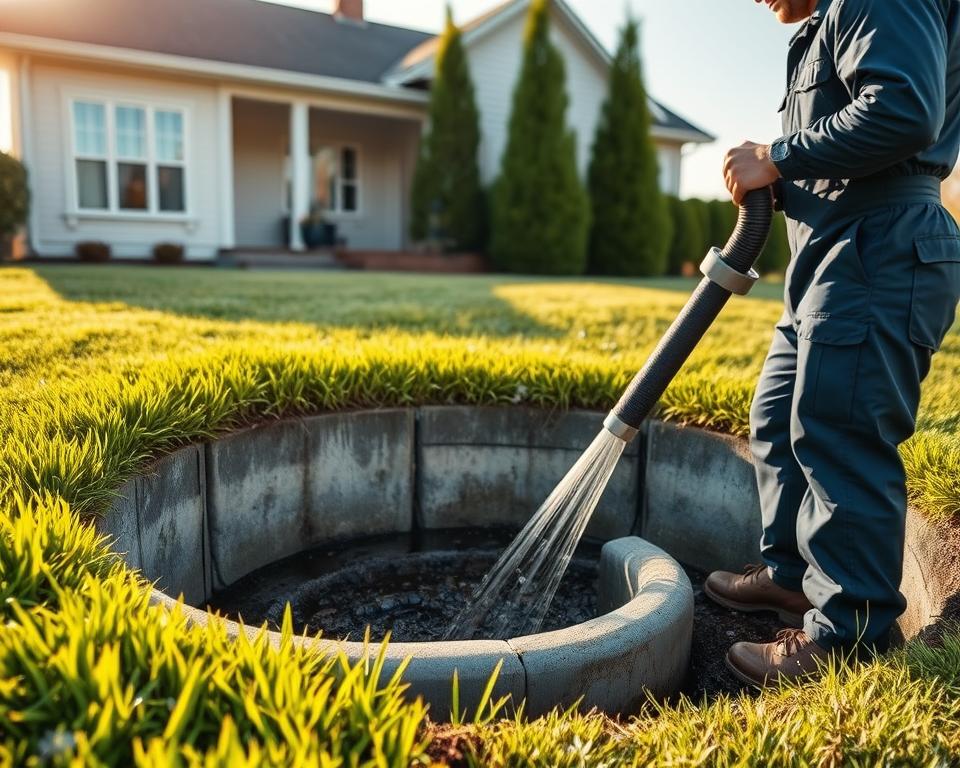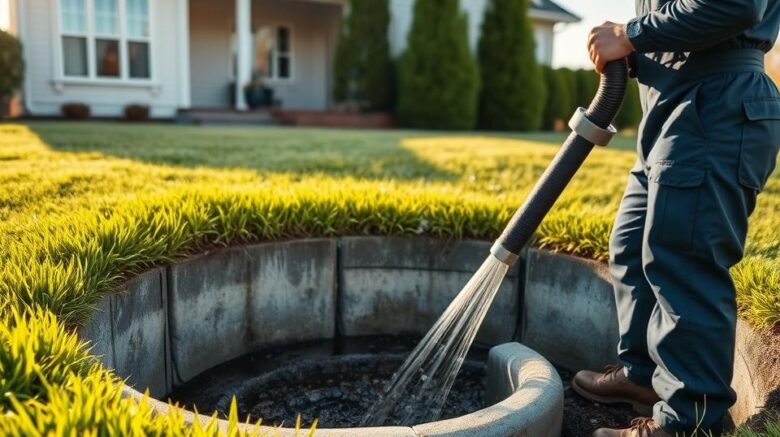Cleaning a Septic System: Maintain Your Tank Well‑Being
Do you ever pondered about the ramifications of ignoring septic system maintenance? For those who use these installations for sewage handling, skipping routine care can lead to hefty expenses. It also poses hazards to both well‑being and the environment. Cleaning your septic system isn’t just a basic task; it’s essential for making sure your home functions smoothly. By consistently emptying your septic tank, you halt sludge accumulation and extend the longevity of your setup. This proactive approach lets you avoid any unwanted scenarios. Find out the significance of septic tank care and the methods entailed with septic tank pumping cost near me.
Core Insights
- Routine septic system cleaning is essential for warding off expensive restorations.
- Overlooking maintenance can cause dangerous conditions for your household.
- Understanding your septic system helps in efficient stewardship.
- Indicators of a troubled septic system should be identified quickly.
- Licensed contractors can assist in keeping optimal tank health.
Understanding Your Septic System
A septic system is an economical on‑property solution for treating wastewater. It mainly includes two sections: the septic tank and the leachfield. Both are essential for ensuring proper sanitation and protecting the environment.
The septic tank gathers wastewater from your home. There, solid particles drop to the floor, and fluids float to the upper layer. Beneficial microbes within the tank digest the organic material, making the outflow more manageable to process. This partially treated wastewater then travels to the absorption area for additional filtering by the ground, finishing the cycle.
It’s crucial for homeowners to appreciate the dynamics of their septic system. Grasping how the septic tank and leachfield work in tandem can foster improved system care. This insight encourages sound maintenance strategies, helping guarantee the system’s robustness.

Significance of Regular Septic System Cleaning
Regular maintenance of the septic system is essential for domestic and environmental health. If overlooked, untreated wastewater can leak into your yard. This spillage can cause groundwater contamination, introducing health hazards. By maintaining the septic system clean, you protect your household and the environment.
It’s advised to clean the septic system every three to five years, depending on how much you load it. Such maintenance is not just environmentally wise; it prevents expensive repairs. A septic system that’s regularly serviced works more efficiently, delivering a safer household and a safer ecosystem.
Warnings Your Septic Tank Needs Cleaning
Homeowners need to recognize clues that their septic tank may need pumping. Primary indicators to watch for include:
- Delayed drainage in basins, showers, and loos
- Bad smells near the leachfield
- Wastewater backups in household plumbing
- Prolonged soggy spots or lush sections of grass over the septic system
It’s important to identify these symptoms promptly to avoid serious septic tank failures. Routine inspections are key. They help spot issues before they turn into costly restorations. Examining your system periodically guarantees it operates well and endures longer.
Being mindful and responding quickly are crucial for septic system care. By monitoring these warning signs, you can maintain your septic system in prime condition.
Septic System Cleaning Intervals
Pumping your septic system on schedule is central to ensuring your home’s plumbing in excellent condition. Specialists usually suggest cleaning the septic tank every 3‑5 years. However, this can change based on the number of your home, how much water you use, and the volume of your tank.
If you have a larger household that draws more water, you might need to pump the system at shorter intervals. Watching your water usage can guide you on if you need to revise your pumping schedule.
All in Sanitation recommends setting up a reliable pumping schedule that fits your household’s specific needs. Adhering to a regular maintenance plan keeps your septic system running efficiently and avoids costly fixes.
Septic System Cleaning: Recommended Methods
For a septic system to stay healthy, homeowners must observe crucial practices. It’s critical not to flush non‑biodegradable items; doing so stops clogs and keeps the system functioning properly. Similarly, limiting harsh chemicals preserves the required bacterial ecosystem. These actions are critical for the system’s life span and effectiveness.
Being proactive with scheduled inspections is crucial. Scheduling regular checks can catch issues quickly, facilitating prompt solutions. Additionally, saving water through repairing drips and mindful usage boosts septic tank health. These practices ensure the system functions smoothly for a long time.
It’s also important not to park on the leachfield. Leaving this area open allows it adequately handle waste water, protecting your system from damage. Following advice from experts like All in Sanitation also boosts septic system care.
The Process of Septic Tank Pumping
For homeowners, learning the septic system service process is important. A licensed septic pumper should conduct routine septic tank pumping to keep your system functioning efficiently. The first step is evaluating the tank’s condition to see when it needs pumping.
A septic tank requires pumping once the solids occupy about 1/3 to 50 percent of its volume. The licensed septic pumper will then clear out these accumulations. This step preserves the system’s effectiveness. Furthermore, the service may entail checking the tank for possible issues, allowing for quick fixes.
Holding a record of each pumping session is smart. This log helps homeowners monitor their septic system’s maintenance, and is helpful if selling the property. Adequate septic system maintenance extends its longevity and reliability, heading off hefty fixes in the future.
Septic Tank Inspection: What to Examine
Regular inspections are crucial for your septic system’s condition. Using a comprehensive septic tank inspection checklist can reveal possible issues early. Inspections should be performed by a licensed contractor every one‑to‑two years. They will assess solid depth and the scum thickness during this visit.
Inspecting the baffles and filters is also crucial. These elements are critical for your septic system’s proper function. Finding leaks or malfunctions quickly can prevent steep repair costs. Preventive steps, like adhering to an inspection checklist, extend your system’s lifespan and performance.
Expert Septic System Services
Using professional septic system services is essential for your septic system’s integrity. By choosing a company like All in Sanitation, you guarantee that skilled technicians take care of the cleaning, check‑ups, and fixes carefully. Certified experts carry expertise, helping homeowners to sustain the system’s peak functionality for decades.
Servicing by certified technicians lowers the risk of surprise failures and expensive repairs. These services include detailed inspections that evaluate the system’s status, locating incipient issues early. Maintaining this forward‑looking posture substantially prolongs your septic system’s longevity.
At the end of the day, handing over your septic system to qualified experts offers peace of mind. Collaborating with companies such as All in Sanitation taps into their experience. It guarantees the integrity of your tank, creating confidence in its maintenance.
Septic System Maintenance Hints for Homeowners
Homeowners have the power to keep their septic systems functioning efficiently. Following effective care hints greatly boosts their performance. Introducing simple tweaks to water usage, like reducing extra use and staggering the use of appliances, decreases load on the system.
Installing water‑saving faucets in your washrooms and kitchens noticeably supports septic longevity. These fixtures cut down water use without compromising functionality. Skipping garbage disposals is smart too, as they cause more solids in the system, necessitating increased upkeep.
Consistent inspections and adhering to a proper maintenance schedule will prolong your septic system’s service. Staying aware of everything that enters your drains is crucial for preserving a balanced septic environment. By embracing these tips, you’ll greatly support your septic system’s functionality and lifespan.
Common Septic System Fixes
Septic systems may encounter various troubles over time, calling for repairs. Typical faults involve leaks, faulty baffles, and percolation troubles in the leachfield. By recognizing the symptoms early, homeowners can tackle them swiftly, keeping their system remains in good condition.
Usual repairs consist of:
- Changing out faulty components to restore system integrity
- Mending or substituting damaged pipes to prevent leaks
- Unblocking plugged lines to ensure proper drainage
Addressing septic issues promptly not only cuts outlays over time but also extends the system’s service years. Scheduled check‑ups and maintenance can help prevent these complications, contributing to the maintenance of a robust septic system.
Final Thoughts
Keeping your septic system robust is key to planetary and household well‑being. Routine pumpings and check‑ups prevent expensive repairs and hazards. Being proactive with septic care conserves resources and reduces concern.
Using specialists like All in Sanitation ensures high‑quality upkeep tailored for your system. Their expertise aids detect issues promptly, avoiding significant troubles and emphasizing the need for scheduled inspections.
Practicing sound methods for septic maintenance delivers long‑term system efficiency. A little maintenance today secures a healthier septic system in the future.
